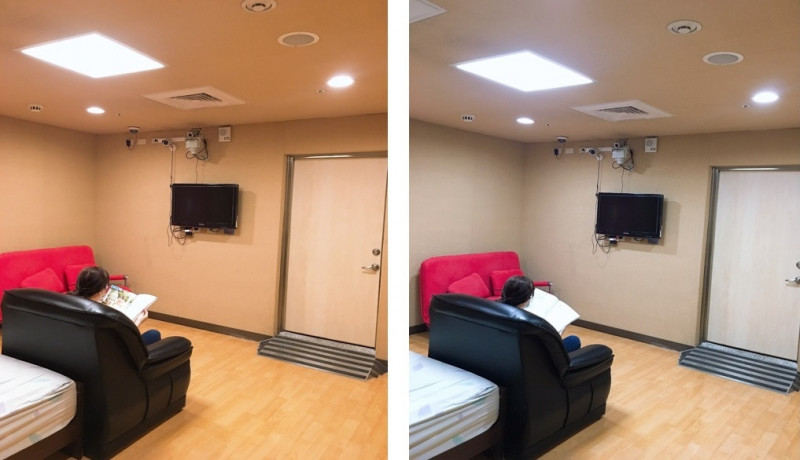The "brain wave-driven wake-up light" developed by High Medical has ergonomic illumination and color temperature. Through different light sources such as warm light (left in the picture) and cool light (right in the picture), it creates a natural light source and can improve sleep disorders. .
(provided by Gaoyi)
[Reporter Xu Lijuan/Kaohsiung Report] Staying up late is easy to hurt the body. The Neurosleep Center of Chung Ho Memorial Hospital affiliated to Kaohsiung Medical University has developed a "wireless sleep brainwave driven light alertness and balance health promotion system before and after awakening" for "night owls". Simulation The "light wake-up" that gradually brightens at sunrise replaces the noisy "alarm clock wake-up", and the "morning light after waking up" replaces the general "indoor light source" after sunrise to improve sleep disorders, and won this year's National Innovation Award.
This creative research and development comes from Xu Chongyao, director of the Department of Neurology and Sleep Center of Advanced Medicine. Xu Chongyao, who specializes in sleep medicine, once went to Alishan for vacation and stayed in a homestay with floor-to-ceiling windows where he could see the sunrise.
On the first day of the holiday, due to the full itinerary and stargazing at night, he didn’t go to bed until 2:30 in the morning. He woke up naturally in the morning light at 6:30 the next morning. He slept for less than 5 hours, but he saw the sky outside the floor-to-ceiling windows gradually Through the light, the surrounding forest is full of insects and birds, but it feels full of vitality. Xu Chongyao suddenly realized that it is like the ancestors returning to the embrace of nature. What people need to be awakened is not the alarm clock, but the sunrise.
Please read on...
Based on this simple idea, the Neurosleep Medicine Core Team of the Advanced Medical Sleep Center, Xu Chongyao convened the two teams of Ke Liwei, a professor at the Institute of Electronic Control Engineering of Yangming Jiaotong University, and Boxin Medical Electronics, including sleep Brain science, wearable brain-computer interface, physiological signal analysis, IoT Internet of Things and intelligent environment control and other academic and technological professionals have jointly developed the "wireless sleep brainwave drive light alertness and balance health promotion system before and after awakening".
Xu Chongyao, director of the Neurology Department and Sleep Center of Advanced Medical, simulated "light wake-up" and "morning light after waking up" to improve sleep quality.
(provided by Gaoyi)
Xu Chongyao said that this system establishes an ergonomic illuminance and color temperature, simulating the "light awakening" that gradually brightens at sunrise and the bright "morning light after waking up" after sunrise, and published the research results in this year's top international conference on sleep medicine. The journal "Journal of Clinical Sleep Medicine" (Journal of Clinical Sleep Medicine) supports the accuracy of the team's research and development device in judging the different stages of sleep and waking, as well as the potential of lighting design to improve alertness and balance.
Xu Chongyao explained that the "Wireless Sleep Brainwave Driving Light Alertness and Balance Health Promotion System before and after awakening" has completed clinical trials in the Sleep Center of Gaoyi, and plans to commercialize it in the future to benefit more patients with sleep disorders.
Among them, a 23-year-old male graduate student is a night owl whose life is reversed day and night. He often goes to bed during the day and sleeps until the afternoon, so he often delays the morning classes. Then gradually return to the normal sleep cycle.
Zhong Yinwen, director of Gao Hospital, pointed out that the research and development of sleep artificial intelligence was included in the "3-year Special Medical Plan" of Gao Medical, and it stood out in the 19th National Innovation Award held by the Biotechnology Medical Science and Technology Policy Research Center. "Innovative medical services" are expected to be widely used in home environments, ward facilities and long-term care institutions in the future.
The Nervous Department and Sleep Center led by Zhong Yinwen (3rd from right), Director of Gao Hospital, developed the "Wireless Sleep Brainwave Driven Light Alertness and Balance Health Promotion System Before and after Wake-up", which won the 19th National Innovation Award.
(provided by Gaoyi)
☆Health news will never be missed, click like to follow the fan page.
☆For more important medical news, please go to Liberty Health.com.
keywords
stay up
sleep disorder
night owl
Ergonomics
related news
